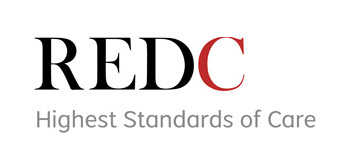REDC members are eating disorder treatment programs that offer higher levels of care. See here for more information on REDC Standards of Excellence Project (STEP) materials.
As a condition of membership in REDC, an eating disorder treatment program agrees to:
- Conduct medical/nursing, psychological, psychiatric, and nutritional assessments within 72 hours of admission to 24/7 care, within 1 week in PHP and as appropriate in IOP
- Maintain appropriate licensure per applicable law
- Maintain continuous clinical staffing by licensed staff or trainees under the direct supervision of licensed staff
- Provide for a multidisciplinary team treatment approach with psychiatric, psychotherapeutic, nutritional, and medical staff
- Complete a multidisciplinary treatment plan within 1 week of admission
- Provide weekly (at minimum) visits by each member of the treatment team
- For 24/7 programs, ensure supervision of residents 24 hours a day by trained program staff
- For 24/7 programs, ensure nursing services on-site and medical staff accessibility 24/7
- Ensure supervision of all meals and snacks by trained program staff
- Communicate a thorough discharge plan to the individual, family and receiving team upon discharge, after necessary permission to release information is obtained
- Admit only patients the program can adequately treat given psychotherapy, nutrition, medical and nursing resources, as applicable
- Maintain accreditation by The Joint Commission or CARF, meeting or exceeding the eating disorder specific accreditation standards
Eating Disorder Level of Care Definitions and Level of Care Criteria
Created in 2020 and adopted in 2021, the REDC Standards Committee defined eating disorder levels of care and criteria for admission to each level of care. REDC’s Level of Care Definitions describe characteristics of each level of care for the treatment of individuals with eating disorders and the Level of Care Criteria outlines criteria for admission across an array of aspects to consider when assessing an individual to determine the appropriate level of care for eating disorder treatment. This document serves as reference for eating disorders treatment programs and individual clinicians and multidisciplinary teams providing level of care recommendations to individuals and families. REDC supports transparency in treatment recommendations and encourages programs and clinicians to conduct through assessments to fully elucidate the range of factors that contribute to the need for a particular intensity of care setting. Review or download the Level of Care Definitions and Level of Care Criteria.
EATING DISORDER TREATMENT ACCREDITATION
REDC worked with the leader of the AED Credentialing Task Force to partner with an accreditation agency to implement the AED Credentialing Task Force CLINICAL PRACTICE RECOMMENDATIONS FOR RESIDENTIAL AND INPATIENT EATING DISORDER TREATMENT. Two accreditation agencies have incorporated these eating disorder standards into their accreditation programs for multiple levels of care, The Joint Commission and the Commission on Accreditation of Rehabilitative Facilities (CARF). All REDC members are expected to be accredited by CARF or Joint Commission.
Standards of Excellence Project
Launched in November, 2018, the “Standards of Excellence Project” (STEP), is a collection of works demonstrating REDC’s continued commitment to raising industry standards and professionalizing the field. STEP represents the strongest, clearest declaration yet of the patient-centered values, beliefs, and principles that guide REDC’s members in their work every day. The components of the Standards of Excellence Project are regularly reviewed and updated by the REDC Standards Committee.
Defining an Eating Disorder Center of Excellence: Created in 2017 and updated in 2018, 2020, and 2021. REDC’s Center of Excellence white paper defines best practices across the entire eating disorders treatment industry. This document serves as an important reference for eating disorders treatment programs that aspire to be best-in-class and seek a blueprint for such success, for patients and families making treatment decisions, and for the wider array of stakeholders — including insurance companies, regulators, media, and others — who seek a concrete understanding of what best-practice care looks like. Read an executive summary here.
REDC Marketing Best Practices: Created in 2017 and updated in 2021, REDC’s Marketing Best Practices identifies concrete ways for REDC members to evaluate their marketing practices. REDC’s policy states: “In marketing their services, REDC members should employ messaging that is truthful, fair, non-deceptive, capable of being substantiated, and in all respects lawful. Marketing messages from REDC members are expected to communicate substantive, critical information about a therapeutic service and arm patients and families with information that allows them to make informed treatment choices. Such messaging has treatment as its primary focus.”
REDC Code of Ethics: Updated in 2021, REDC codified the principles in its Center of Excellence document into a Code of Ethics specifically for REDC member organizations. REDC’s members understand that just as they seek objective validation of other fields’ claims of high standards, their external stakeholders — members of the public, insurance companies, academics, regulators, and others — are more likely to trust them when they demonstrate a willingness to establish clear boundaries and practices. REDC’s Code of Ethics demonstrates that its members are governed by specific ethical principles.
REDC Standards of Excellence of Medical Care for People with Eating Disorders: Updated in 2022, the Standards of Excellence of Medical Care for People with Eating Disorders outlines specific criteria for determining when patients should be admitted to a hospital for evaluation versus being directly admitted to a residential eating disorders treatment program. REDC’s policy is that in the best interest of patients, residential programs are strongly encouraged to establish a working relationship with a hospital and/or physicians who are trained to do an appropriate medical evaluation for patients with serious eating disorders.
REDC: A Track Record of Success: This quick, 2-pager summarizes REDC’s work to date to raise industry standards, professionalize the field, and advocate for greater patient access to care.
